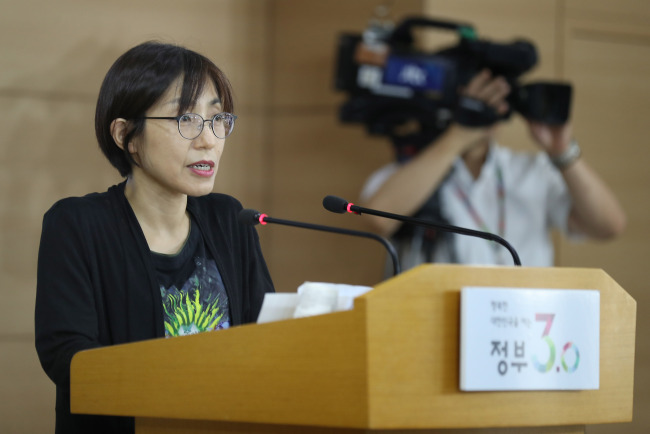The Korea Centers for Disease Control and Prevention said Thursday that it has confirmed this country’s second case of cholera in Geoje, South Gyeongsang province.
The confirmation comes two days after the discovery of South Korea’s first case of cholera in 15 years.
According to the health authorities, a 73-year-old woman was confirmed to have been infected with cholera after she ate defrosted raw Spanish mackerel for lunch on Aug. 14.
The woman reportedly told health care officials that she shared the raw fish a day after it was caught with her neighbors on Aug. 13. It was stored in a freezer overnight.
The 11 others who ate lunch with her did not show any symptoms, and further tests showed that they were not infected.
She was sent home on Wednesday upon recovery, after being quarantined and treated for nine days.
 |
Kwak Sook-young, head of the Center for Infectious Disease Control at the Centers for Disease Control and Prevention delivers a press briefing on Thursday. (Yonhap) |
The CDC said that that it was conducting Pulsed-field Gel Electrophoresis (PFGE) analysis -- an analysis technique to produce a DNA fingerprint for a bacterial isolate -- to check if the infected woman has any connection to the first case confirmed on Tuesday. It will take 24 hours for the result to come out, authorities said.
On Tuesday, a 58-year-old man was infected with cholera in the southern city of Gwangju. He was the first person in 15 years to have caught cholera without traveling abroad.
Experts suggested that the infection could have been caused by food that was possibly carrying the cholera bacteria -- Vibrio cholera -- when it was imported from overseas.
“Although both the infected man and woman had eaten seafood caught in Geoje region, we have not yet found any connection between these two cases,” said Kwak Sook-young, head of the Center for Infectious Disease Control at the Centers for Disease Control and Prevention, during the press briefing on Thursday.
Meanwhile, the CDC said that it installed an emergency situation room on Thursday to monitor the outbreak of cholera.
“We are in contact with health supervisors at each city and province 24/7, in order to make sure that we can immediately report any additional cases,” said Kwak.
“Although we cannot rule out possibility of additional cholera outbreak, we have found no (contaminants) during assessments of groundwater here in the past 15 years,” she added.
Cholera infections can come from contaminated groundwater or food, such as fish, shellfish or water. In rare cases, direct contact with an infected person’s excrement or vomit can also lead to infection.
Cholera normally has an incubation period of 2-3 days. Symptoms include diarrhea, nausea, muscle cramps and dehydration, while severe cases can lead to death.
South Korea saw the highest number of recent cholera cases in 2001, when there were 162 infected individuals, mostly in the in Gyeongsang region. The record was followed by 145 infected people in 1980, 113 in 1991 and 68 in 1995.
By Kim Da-sol (
ddd@heraldcorp.com)








![[Today’s K-pop] Blackpink’s Jennie, Lisa invited to Coachella as solo acts](http://res.heraldm.com/phpwas/restmb_idxmake.php?idx=644&simg=/content/image/2024/11/21/20241121050099_0.jpg)